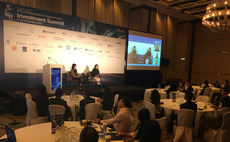
Storm warning: Investors prepare for macro difficulties
The coronavirus outbreak appears to be fast-tracking a long-expected economic downturn. The situation is very different from the aftermath of the global financial crisis, but PE investors may still draw instruction from the events of 2008-2009
Even before the outbreak of coronavirus disease, Asia was seen as heading for a downturn. Bain & Company's latest regional PE report, the bulk of which was compiled several months ago, warned of global turbulence ahead. It pointed to IMF estimates that growth in 90% of the world slowed to its lowest rate since 2010 last year and that the China-US trade war could cost $700 billion in 2020.
In the accompanying survey of Asia Pacific GPs, 47% believed the market had peaked or was in recession, 59% were very worried about macroeconomic conditions – mostly financial pressures and the US-China trade war – and 96% expected a downturn in the next two years.
There were already concerns about dwindling exits in Asia and the impact this would have on LPs which have long fretted at how the region's stunning paper gains struggled to translate into material distributions. Exits were down 41% year-on-year as large-cap trade sales dried up and public market trades fell off a cliff. Towards the end of 2018, contributions to Asian funds crept ahead of distributions for the first time in five years and the imbalance remains.
Also lingering in plain sight is the question of how managers will sustain returns on deals that have been trading at record multiples. Since 2016, more than 40% of private equity investments in Asia had entry valuations in excess of 15x EBITDA to enterprise value. This compares to 25-30% for 2010-2015.
With coronavirus escalating from localized crisis to global pandemic, all bets are now off. The collapse in Asia fundraising, investment and exit activity during the first two months of 2020 is well-documented. The damage inflicted on portfolio companies – financially and operationally – in many cases remains to be seen. Presumably, these same phenomena will play out globally, causing enough havoc to the economy that even a V-shaped recovery in Asia would offer little mitigation.
Plenty of comparisons have been drawn between coronavirus and the SARS epidemic of 2002-2003. They come with the standard caveats: this time around the world is more interconnected, China is more economically significant, and the virus is more virulent.
It remains to be seen whether similar comparisons hold between the fallout from COVID-19 and the global financial crisis. From a private equity perspective, this time around much is different. As a recent EY report observes, the industry has a larger amount of capital at its disposal, it is more diversified in sources and structures of financing, there is greater operational capability within private equity firms, and LPs are increasingly sophisticated and have access to better portfolio management tools.
Investors may indeed put capital to work more quickly than during the disruption of 2007-2009. Some of the groundwork has already been done, reflected in a focus on defensive rather than cyclical industries, an emphasis on flexible financing packages, and a greater reliance on internal and external resources to stormproof portfolios. The global private equity firms are also different creatures, with more diverse pools of capital and a wider variety of strategies at their disposal.
That said, there will still be winners and losers. Bain examined how Asia's private equity industry performed during the global financial crisis for some pointers into what distinguished one from the other. Control, active portfolio management and a focus on larger deals all paid off, which should come as little surprise. These are expected to be key characteristics of the next phase of the asset class in Asia.
Two other factors were also highlighted: the ability to pick winning companies is more important than choosing sectors; and the most successful investors were sharp in timing their exits. Both could be linked to the relative immaturity of the region's private equity community, and the second is inextricably tied to the bugbear about paper gains versus realizations. Plenty of managers have been seduced by growth stories and foregone 3x today in the hope of getting 5x tomorrow.
Latest News
Asian GPs slow implementation of ESG policies - survey
Asia-based private equity firms are assigning more dedicated resources to environment, social, and governance (ESG) programmes, but policy changes have slowed in the past 12 months, in part due to concerns raised internally and by LPs, according to a...
Singapore fintech start-up LXA gets $10m seed round
New Enterprise Associates (NEA) has led a USD 10m seed round for Singapore’s LXA, a financial technology start-up launched by a former Asia senior executive at The Blackstone Group.
India's InCred announces $60m round, claims unicorn status
Indian non-bank lender InCred Financial Services said it has received INR 5bn (USD 60m) at a valuation of at least USD 1bn from unnamed investors including “a global private equity fund.”
Insight leads $50m round for Australia's Roller
Insight Partners has led a USD 50m round for Australia’s Roller, a venue management software provider specializing in family fun parks.





